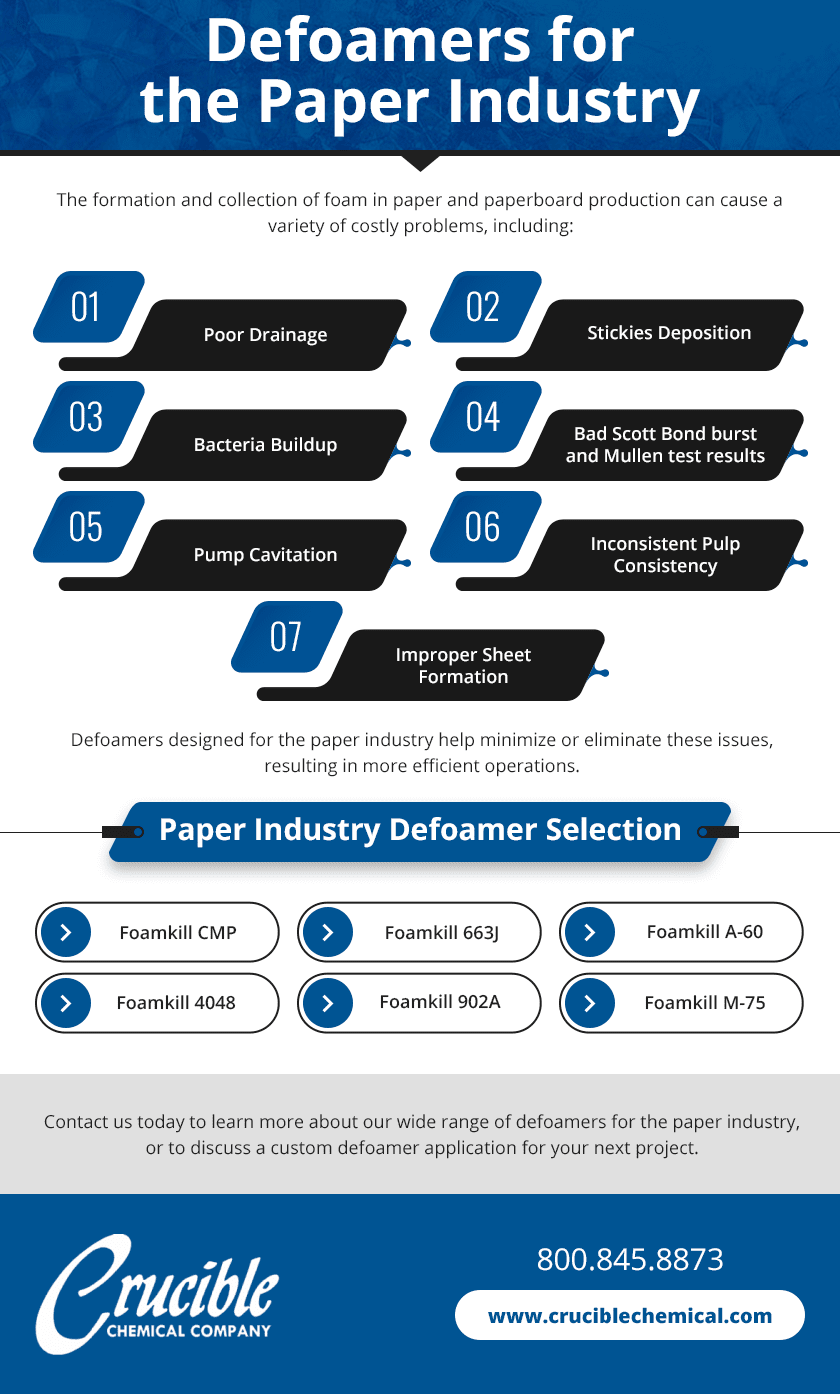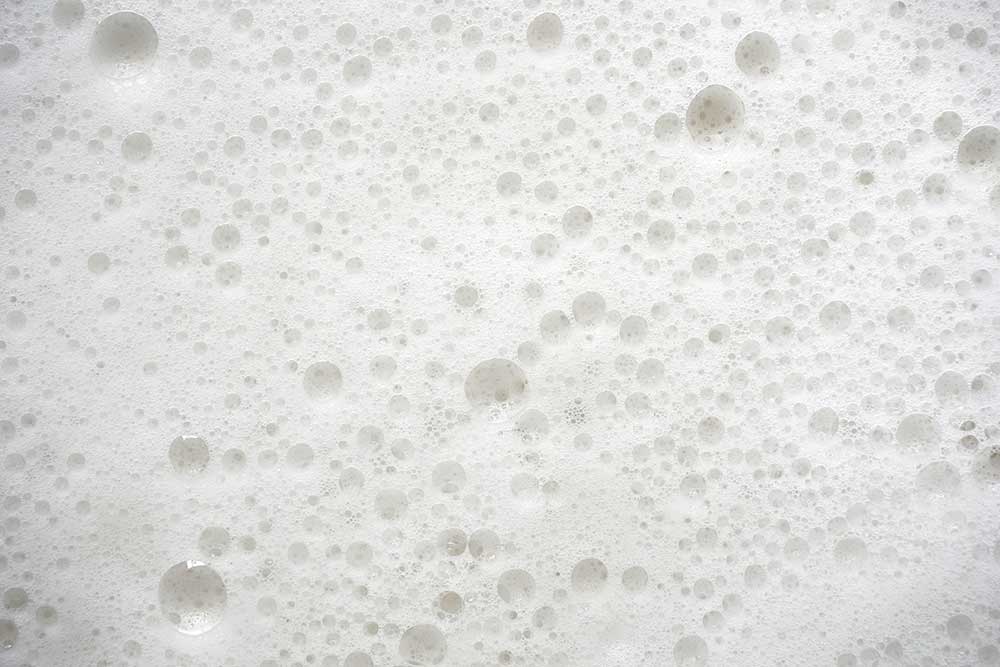The Role of Defoamers in the Chemical and Food Processing Industries
The Role of Defoamers in the Chemical and Food Processing Industries
Blog Article
Discover the Top Benefits of Making Use Of Defoamers in Industrial Processes
The utilization of defoamers in commercial procedures provides an array of engaging benefits that can boost functional performance and product top quality. By effectively regulating foam production, these agents not just optimize material flow but also contribute to substantial price decreases and enhanced sustainability. The ramifications of adopting defoamers might be a lot more profound than initially regarded.
Improved Process Performance
Optimizing industrial procedures frequently includes attending to frothing issues, which can prevent operational effectiveness. Foam development can hinder the correct performance of devices, decrease the effective use of resources, and complicate the surveillance of important specifications. By carrying out defoamers, industries can successfully alleviate these problems, resulting in streamlined operations and improved productivity.
Defoamers work by destabilizing the foam framework, enabling fast collapse and significant reduction in foam volume. This activity not only improves the flow of products through devices, such as pipes, mixers, and reactors, however also minimizes interruptions created by foam overflow. Tools downtime is lowered, permitting for a much more efficient and continual production procedure.
Additionally, making use of defoamers can cause reduced power usage. With less foam to manage, pumps and compressors can operate extra efficiently, causing lower operational prices and a general improvement in process throughput. Eventually, the critical use of defoamers not only addresses immediate lathering challenges however also adds to a much more reliable commercial ecological community, promoting an affordable benefit in a requiring market.
Improved Product Quality
The assimilation of defoamers in commercial processes plays an essential role in boosting product quality. By effectively regulating foam formation, defoamers add to the uniformity and harmony of last products. Extreme foam can result in aeration, which adversely influences the texture and security of formulas, specifically in industries such as food and drugs, drinks, and finishes.

In addition, defoamers help with better mixing and diffusion of ingredients, causing homogeneity in formulations. This is important in applications where exact component proportions are important for performance and safety and security. Furthermore, the removal of foam can reduce the danger of contamination throughout production, additional guarding item honesty.
Inevitably, by boosting product quality, defoamers not just boost customer satisfaction but additionally reinforce brand credibility. Their function in maintaining high-grade standards underscores their importance in modern commercial procedures.
Expense Decrease Advantages
Executing defoamers in industrial procedures can bring about considerable expense decrease advantages. By effectively controlling foam development, defoamers reduce item loss throughout manufacturing, therefore optimizing product use. This reduction in waste converts directly right into reduced basic material expenses, boosting overall operational effectiveness.
Moreover, using defoamers can lower energy consumption. Too much foam can prevent tools efficiency, leading to boosted energy requirements to keep manufacturing degrees. By mitigating foam, defoamers help with smoother operations, enabling equipment to run much more effectively and reducing power expenditures.

In addition, defoamers can site shorten processing times. Foam can produce extra obstacles that extend production cycles. By using defoamers, industries can improve their procedures, bring about faster turnaround times and enhanced throughput. This performance not only increases manufacturing yet additionally allows business to satisfy market demands a lot more promptly.

Environmental Influence Reduction
In commercial procedures, using defoamers plays an essential function in mitigating ecological impacts connected with foam generation. Foam can bring about considerable functional inefficiencies, resulting in raised emissions and waste generation. By efficiently managing foam, defoamers aid maintain procedure effectiveness, consequently minimizing the general ecological impact of procedures.
Moreover, excessive foam can overflow containment systems, leading to spills that might contaminate soil and water sources. Defoamers assist lessen this risk by making certain that foaming does not exceed prescribed limits, advertising compliance with environmental policies. This aggressive strategy not only safeguards ecosystems yet additionally boosts the sustainability of industrial techniques.
Furthermore, using defoamers can reduce energy consumption in various processes. defoamers. Decreasing foam development reduces the demand for additional energy-intensive steps, such as boosted anxiety or pumping, which may otherwise be essential to take care of foam. The adoption of defoamers lines up with wider sustainability objectives by advertising energy effectiveness while decreasing the carbon impact of commercial activities.
Eventually, incorporating defoamers into industrial procedures is a strategic procedure that sustains environmental stewardship and liable resource administration.
Versatility Across Industries
Across numerous sectors, defoamers demonstrate impressive adaptability, adjusting to the particular requirements of diverse applications. In the food and drink market, as an example, defoamers are important to maintaining check this site out product high quality by preventing foam formation throughout handling, which can affect structure and flavor. Likewise, in the pharmaceutical market, defoamers guarantee the security of formulas, enhancing item efficacy and uniformity.
In the chemical production world, defoamers promote smoother procedures by minimizing foam in response vessels, hence improving yield and decreasing downtime. The paper and pulp market depends on defoamers to boost the effectiveness of pulp handling and paper production, ensuring ideal item integrity. Furthermore, in wastewater therapy centers, defoamers play a crucial duty in managing foam throughout aeration procedures, resulting in improved therapy results.
The adaptability of defoamers encompasses the oil and gas market, where they help in handling foam in drilling liquids and manufacturing procedures. By tailoring solutions to fulfill particular industry needs, defoamers function as crucial devices that boost operational efficiency, item quality, and total procedure efficiency across a wide range of industries. Their versatility underscores their worth in contemporary commercial applications.
Conclusion
Finally, the application of defoamers in commercial processes presents various benefits, consisting of enhanced efficiency, enhanced item high quality, considerable price decreases, and favorable ecological effects. Their capacity to efficiently manage foam development adds to functional continuity and source optimization. In addition, the flexibility of defoamers throughout varied markets underscores their essential duty in promoting lasting methods and profitability. The integration of defoamers stands for a critical technique to dealing with difficulties connected with foam administration in various making atmospheres.
Ultimately, the critical use of defoamers not only addresses prompt foaming difficulties yet additionally adds to a much more reliable commercial ecological community, cultivating an affordable about his advantage in a requiring market.
In industrial processes, the usage of defoamers plays an essential function in mitigating ecological effects connected with foam generation. By successfully controlling foam, defoamers help keep procedure efficiency, thereby reducing the overall environmental footprint of operations.
Additionally, in wastewater treatment facilities, defoamers play an essential role in regulating foam throughout aeration processes, leading to better treatment results.

Report this page